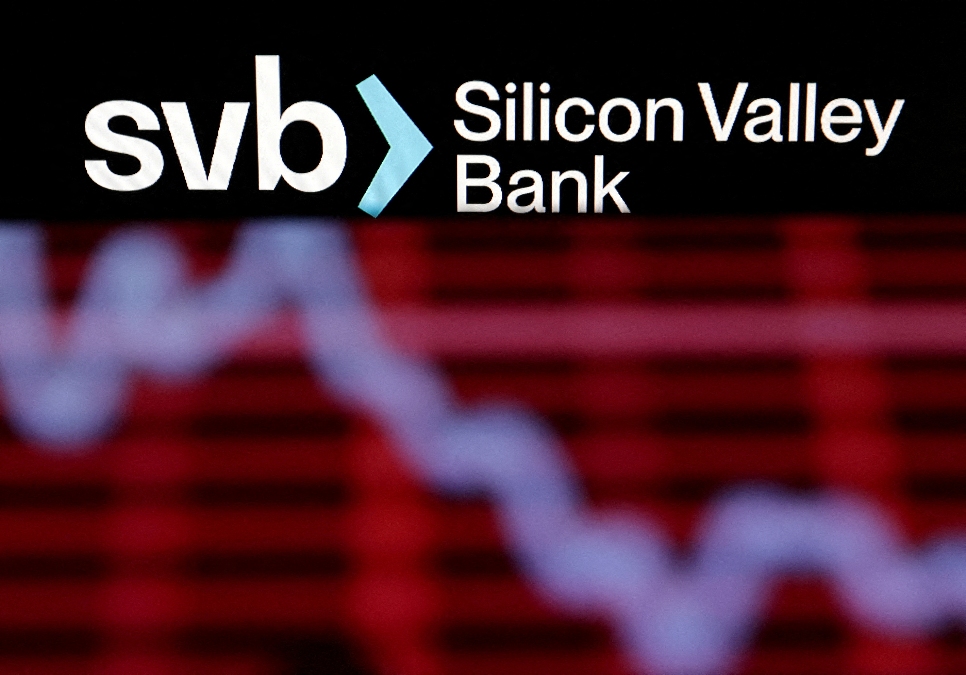
The sale of failed Silicon Valley Bank (SVB) to a regional U.S. peer helped stabilise shares in European lenders on Monday, after the sector was hammered last week by worries about systemic bank stress and a looming credit crunch.
The sudden collapse of tech-focused SVB earlier this month triggered the worst banking shock since the 2008 global financial crisis and drew some of Europe’s biggest lenders into investors’ focus.
Signs that SVB’s failure is being resolved by authorities in a smooth manner could help underpin confidence, especially among the fragile U.S. regional banks, whose stocks rose sharply in pre-market trade.
First Citizens BancShares Inc has bought all the loans and deposits of SVB and gave the Federal Deposit Insurance Corp (FDIC) equity rights in its stock worth as much as $500 million in return.
First Citizens will also have an agreement with the regulator to share losses to provide further protection against potential credit losses.
Its shares were up 25% in pre-market trade.
The FDIC estimates SVB’s failure will cost a federal deposit insurance fund about $20 billion.
“There is relief that First Citizen Bank, one of America’s largest family-controlled banks, has come to the rescue,” said Susannah Streeter, head of money and markets, Hargreaves Lansdown.
“A calm of sorts has descended on the banking sector but hopes that this move will see significant stability return may be short-lived,” she added.
Banking stocks in Europe were higher on Monday after a torrid previous session. Germany’s biggest lender Deutsche Bank, which had slumped 8.5% on Friday alongside a sharp jump in the cost of insuring its bonds against the risk of default, rose 5.2%.
A broader index of Europe’s top banks rose 1.4%, after sliding nearly 4% in the previous session.
The First Citizens deal for SVB sealed the first weekend in several weeks that did not bring news of fresh banking collapses, rescues or emergency help from authorities.
Buying Time
The collapse of SVB and New York-based peer Signature Bank has sent U.S. depositors fleeing smaller regional banks for larger cousins.
Bloomberg News reported U.S. authorities were in early stage deliberation about expanding emergency lending facilities which could give First Republic Bank more time to shore up its balance sheet.
Shares in First Republic, the future of which has been at the centre of investors’ concerns, jumped by more than 25% in pre-market trading on Monday, with peers Western Alliance Bancorp and PacWest Bancorp climbing 5.4% and 9.2%, respectively.
Major U.S. banks JPMorgan Chase & Co, Citigroup and Bank of America advanced between 0.8% and 1.4%.
The Stoxx index of European bank shares is still down more than 17% this month, however, and the U.S. KBW regional bank index has lost 20%, with investors on edge about what’s next.
Carrots, Sticks and Acronyms
The sudden spike in tensions for banks has raised questions about whether major central banks will continue to pursue aggressive interest rate hikes to tamp down inflation, and whether tightened lending will hurt the global economy.
A U.S. Federal Reserve policymaker said on Sunday that stress in the banking sector is being closely monitored for its potential to trigger a credit crunch, with a European Central Bank official also flagging a possible tightening in lending.
In a credit crunch, banks restrict the amount they are willing to lend to consumers and businesses due to heightened concerns about their customers’ ability to pay back their loans.
Some small and concentrated crunches can weigh on growth without bringing the full economy to a standstill. Deeper lending clamp-downs can hobble the economy for years.
Even before the present crisis erupted, bank lending to euro zone companies had slowed for the fourth straight month in February as an economic downturn and increased caution from lenders appeared to take their toll.
On the upside, business morale in Germany, Europe’s largest economy, unexpectedly rose in March despite the banking turmoil.
In the United States, where flows into less risky money market funds have risen by more than $300 billion in the past month to a record atop $5.1 trillion, focus is on depositors’ confidence.
The SVB deal may shore some of that up. First Citizens said it would take on assets of $110 billion, deposits of $56 billion and loans of $72 billion, and expand in California. It will share further potential losses with the FDIC and the FDIC retains some $90 billion in securities held for disposal.
“Effectively you’re going to get a combination of carrots, sticks, and acronyms in order to ensure you get the outcome you want and that allows (authorities) to still use interest rates to combat inflation,” Rabobank strategist Michael Every said.
“This seems to be part and parcel of that.”
(Reuters)
Inside Telecom provides you with an extensive list of content covering all aspects of the Tech industry. Keep an eye on our News section to stay informed and updated with our daily articles.